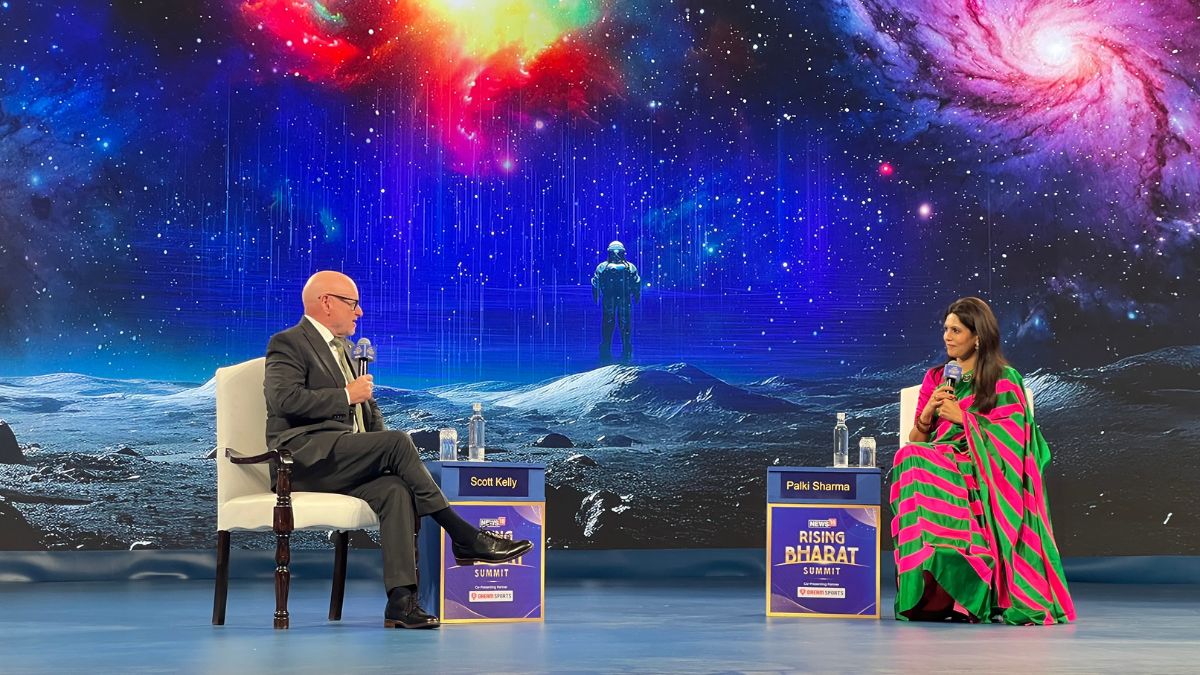At the News18 Rising Bharat Summit held on April 9, 2025, at the Bharat Mandapam in New Delhi, former NASA astronaut and retired US Navy Captain Scott Kelly shared an in-depth perspective on life aboard the International Space Station (ISS).
With a distinguished career that includes commanding the ISS on Expeditions 26, 44, 45, and 46, and accumulating over 520 days in space, Kelly provided a detailed account of the daily routines and challenges faced by astronauts.
WATCH: Astronaut Kelly takes you through a typical day in Space
Kelly began by outlining a typical day on the ISS, noting that operations are conducted on Greenwich Mean Time (GMT).
“Well, a typical day, we operate on the space station on Greenwich Mean Time. So you generally wake up, you know, six in the morning, Greenwich time, you might do some quick science experiments that involve taking like medical samples of yourself that you have to do when you wake up. You know, quickly do your morning activities like making believe you’re taking a shower by, you know, moving the dirt around on your body with a washcloth, having a quick breakfast.”
Watch:
#RisingBharatSummit2025 LIVE: In conversation with Firstpost's Managing Editor @Palkisu, Scott Kelly (@StationCDRKelly), Former NASA Astronaut & Retd. US Navy Captain talks about the future of space technology. https://t.co/sH0yz3YBT7
— Firstpost (@firstpost) April 9, 2025
He elaborated on the work schedule, highlighting the blend of scientific research and maintenance tasks: “And then the next 12 hours is a combination of doing science experiments, doing general maintenance, kind of like things you would do in your home just to keep it operating, and then fixing the hardware that may break that’s unexpected. You do a lot of exercise and then at the end of the day, probably around dinner time, maybe seven o’clock in the evening, you woke up at six. So 13 hours later, you have a conference with the ground to talk about the plan the next day, eat dinner, and then maybe have a couple hours of your own time in the evening.”
Highlighting the structured nature of life on the ISS, Kelly added: “And then repeat that the next day. Occasionally, it’s interrupted by things like doing a spacewalk or robotics activities. But generally speaking, most days, it’s a combination of doing science and, you know, just fixing stuff or maintaining stuff on the space station.”
Addressing the work-life balance, Kelly mentioned the crew’s schedule: “We get like one day off, generally a week if things are going normally. So it’s mostly about six days of work a week with a Sunday off. You generally exercise either six or seven days a week.”
He also shared his personal approach to exercise: “Some people exercise every single day. I had to always take a day off. It was more like mental health day for me where I had to just relax and try to do nothing if I could get away with it.”
Challenges of microgravity
Discussing the effects of microgravity, Kelly provided insights into the complexities it introduces: “Well, I think a lot of people think that the microgravity would be the most awesome thing ever. Whether it’s, you know, being able to go from here to the other side of the room very quickly with little effort. Yeah, that’s fun.”
He continued, explaining the practical difficulties: “But it makes most things that you do so much more difficult when you can’t put anything down. You always have to either stick it in your pocket, tape it to the wall, Velcro it somewhere. There are two things that are easier. Everything else is harder. And that is moving stuff that is heavy because it no longer has weight, still has mass. You have to be conscious of things that have a lot of mass when you’re moving it around. And then just putting your body in different positions to do your work. That’s very easy to do that. Everything else is harder, including sleeping.”
On the topic of rest, Kelly reflected on the adaptations required for sleeping in a weightless environment: “I think, you know, we evolved sleeping in gravity. And for me, there are certain aspects of sleeping in space that are more comfortable, and certain aspects that are less comfortable. And overall, I just always prefer to sleep in a nice bed with a pillow.”


)

)
)
)
)
)
)
)
)



